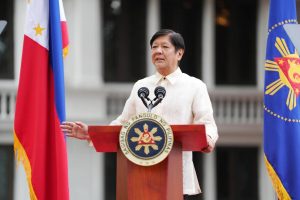Philippine President Ferdinand Marcos yesterday extended his congratulations to Lai Ching-te, the winner of Taiwan’s presidential election, saying that he was looking forward to “close collaboration.”
“On behalf of the Filipino people, I congratulate President-elect Lai Ching-te on his election as Taiwan’s next president,” Marcos wrote yesterday on the social media platform X (formerly Twitter). “We look forward to close collaboration, strengthening mutual interests, fostering peace and ensuring prosperity for our peoples in the years ahead.”
Such congratulatory messages are very much routine following elections, but take on an acute diplomatic sensitivity in the case of Taiwan, which China views as a breakaway province that it is determined to reunify with the mainland – ideally peacefully, but if necessary by force. The sensitivities are heightened further by the fact that Lai belongs to the Democratic Progressive Party, and will follow outgoing President Tsai Ing-wen’s policy of safeguarding the island’s de facto independence from China and further aligning it with other democracies.
After U.S. Secretary of State Antony Blinken congratulated Lai on his victory, China’s Foreign Ministry stated that his message sent “a gravely wrong signal to the ‘Taiwan independence separatist forces,” and violated the U.S. commitment to maintain only unofficial ties with Taiwan.
Marcos’ congratulatory message is therefore unlikely to do much to improve relations with China, which are already in a slump following a year of growing tensions in the South China Sea.
Since 1975, when it formally recognized the People’s Republic of China (PRC), the Philippines has adhered to its version of the “one China policy.”
In the Joint Communique signed by Marcos Sr. and Chinese Premier Zhou Enlai, Manila stated that it “recognizes the Government of the People’s Republic of China as the sole legal government of China” and “fully understands and respects the position of the Chinese Government that there is but one China and that Taiwan is an integral part of Chinese territory.” The slight ambiguity in this phrasing – in particular, the use of the phrase “understands and respects” – was reduced in a Joint Statement issued in 2000, in which the Philippines stated that it “recognizes that Taiwan is an integral part of Chinese territory.”
The Philippine position is considerably closer to Beijing’s “one China principle” – that there is one China, that Taiwan is an inalienable part of it, and that the PRC is the sole legal government representing it – than to the “one China policy” of its longtime treaty ally, the United States. Washington recognizes the PRC as the sole legal government of China but only acknowledges, and does not accept, the Chinese position that Taiwan is part of China. (To add to the confusion, the Philippines’ Southeast Asian neighbors each profess some version of the “one China policy,” which differ in their wording and nuances.)
When asked earlier for a reaction to the outcome of Taiwan’s presidential election, the Department of Foreign Affairs stated that the Philippines remains “committed” to its One-China Policy. Indeed, Marcos Jr.’s congratulatory message does not constitute a shift in Philippine policy, though it does arguably reflect a recent shift in emphasis and tone.
As Renato Cruz De Castro wrote for the Brookings Institution in March of last year, Manila’s “rigid and legalistic” adherence to the “One China Policy” has given way to a more active policy toward Taiwan. Particularly under Marcos, who has gravitated toward the U.S. and resisted Chinese assertiveness in the South China Sea, the Philippines has “openly expressed the need to cooperate with Washington in a possible strategic exigency in Taiwan.”
This shift is partly due both to geographic proximity – Taiwan is the Philippines’ closest neighbor – and to the fact that the Philippines’ status as a U.S. security ally has de facto embroiled it in the growing U.S.-China tensions over Taiwan. For these reasons, Macros stated in a recent interview, “it’s very hard to imagine a scenario where the Philippines will not somehow get involved” in a conflict over Taiwan.
As Mico A. Galang of the National Defense College of the Philippines noted in a recent paper, it also partly reflects the fact that the status quo serves the Philippines well. This is a situation in which Taiwan functions as a “strategic buffer” against China’s broader goal of dominating the “first island chain,” and thus enables “a balance of power favorable to the Philippines and like-minded countries.”
While Galang emphasized that Manila has no interest in advocating formal Taiwanese independence, due to the likely Chinese military response, Manila, like Washington, has continued to do what it can to enhance its unofficial relations with Taipei – economic, diplomatic, and cultural – within the limits of its One China Policy.
Marcos’ congratulatory statement, with its subtle implication that Taiwan is a “normal” country, subtly pushes up against these limits.

































